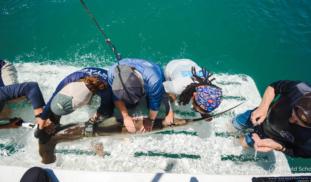Please wait...
About This Project
Sharks use solutes, such as urea, to prevent cellular water loss. While the mechanisms of urea retention are well studied, no studies have accessed urea loss in the field or across multiple species. This study will provide insight into how sharks moderate water loss by collecting non-invasive urea samples from the shark gill interface. This project will allow us to determine urea concentrations at the surface of shark gills and to better understand how sharks use urea to control water loss.






